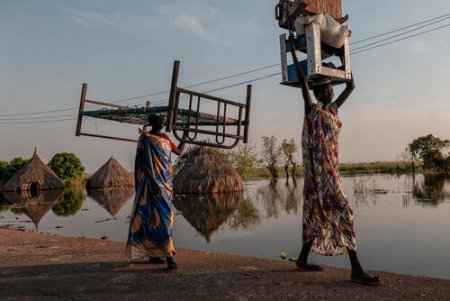
When the floodwater levels started rising in her village, 21-year-old Nyabeel and her husband were torn about what to do. Leaving their land, which they relied on for food, was a tough decision. “We spent three days moving. It was challenging, with four children and a herd of goats,” she says.
Eight months since flooding began, people in Unity State, northern South Sudan, continue to suffer, stuck in poor living conditions and at risk of outbreaks of infectious and waterborne diseases. Spread across several makeshift camp sites, they face food insecurity, a loss of income, malnutrition, and a lack of safe drinking water. An estimated 835,000 people have been affected.
In her village, Nyabeel had relied on cultivating her land and milk from her goats for food. “We had a more stable life than the one here, now we eat one meal a day of maize.” Nyabeel had brought her one-year-old to MSF’s mobile clinic in Kuermendoke camp, Rubkona town, for treatment for severe malnutrition and essential vaccinations. Kuermendoke is one of three camps that have a high percentage of children under five suffering from severe acute malnutrition.
“Our nutritional survey demonstrated that the severe acute malnutrition prevalence in the camps is well above the WHO’s 2 per cent emergency threshold,” says Dr Reza Eshaghian, MSF medical team leader for emergency flood response.
The impact of the flooding is palpable, says Dr Eshaghian. “When you walk through the camps, you see malnourished children, people collecting dirty flood water to drink, cattle collapsing and their carcasses everywhere. Such poor conditions are harming people’s health.”
Source: MSF







